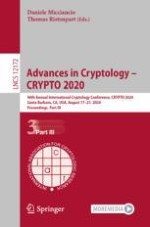
2020 | OriginalPaper | Buchkapitel
Two-Sided Malicious Security for Private Intersection-Sum with Cardinality
verfasst von : Peihan Miao, Sarvar Patel, Mariana Raykova, Karn Seth, Moti Yung
Erschienen in: Advances in Cryptology – CRYPTO 2020
Aktivieren Sie unsere intelligente Suche, um passende Fachinhalte oder Patente zu finden.
Wählen Sie Textabschnitte aus um mit Künstlicher Intelligenz passenden Patente zu finden. powered by
Markieren Sie Textabschnitte, um KI-gestützt weitere passende Inhalte zu finden. powered by